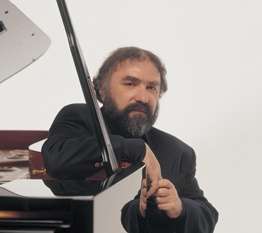|
Back
Notes Distilled and Clarified New York
Isaac Stern Auditorium, Carnegie Hall
01/24/2013 -
Franz Schubert: Four Impromptus, D. 935
César Franck: Prélude, Choral et Fugue
Claude Debussy: Préludes, Book II
Radu Lupu (Pianist) 
R. Lupu (© Decca Records)
Radu Lupu’s problem isn’t his piano-playing. For 40 years, since winning both the Van Cliburn and Leeds competitions, he has been one of the stellar attractions of the concert stage.
Rather, it is the corona of mysticism with which he has been cloaked over these years. He gives virtually no interviews, has made only 20-odd recordings for Decca, and gives himself neither airs nor graces on the stage. He resembles Johannes Brahms in his later years, the now white long beard, the black suit, black shirt. He sits not on a piano stool but what looks like an office desk chair, puts his hands on the keys, and virtually never moves anything but his fingers during a recital.
In a way, outside of the music, a Radu Lupu recital is less a religious experience than a Trappist ritual, the sounds of the piano the only interruptions.
And truth be told, Mr. Lupu did play with an unfettered dedication. Was he performing for himself, not his audience? Yes, but integrity is the whole game. And while this was an introspective concert, there were moments of absolutely astounding beauty.
The César Franck Prelude, Chorale, and Fugue is an epic work, probably his best, but with its organ-like sonorities, is difficult for any pianist to bring off. That very spirituality was exactly what Radu Lupu needed to bring out that inner inspiration. But the introspection was not in volume. Mr. Lupu gave it a grandiose reading, the resonances of the ethereal major theme played like bells. The end of the fugue was given more voice than anything of the whole evening. Had the rest of the concert been so grand, so all-enveloping, he would be considered not simply an icon or integrity but (gulp!) a fascinating musician.
This was not to be. The first time I heard Mr. Lupu in a live performance, I was expecting so many “magical” things that his playing was, to me, disappointing. This time, I simply listened, expecting only what he wanted to give me.
In the Schubert Impromptus, I could not classify them, as, say, with a Brendel or Ashkenazy. Rather, they became music which ensued from the pianist’s mind and fingers with such an intrinsic casual correctness, that one could only sit back and hear familiar music played as though it were the first time. Nothing was idiosyncratically different, but those gorgeous tunes (the best in the centers of the four works) that they seemed to come out of Mr. Lupu himself.
The second half was devoted to Book II of the Debussy Préludes. Mr. Lupu has never been reputed for playing French music (and the Franck last night was Germanic). As expected, though, Debussy, who distilled his pictures into notes, was given further distillation by Mr. Lupu. So distilled, in fact, so rarefied, so ethereal, that at times the music was almost turned into a vapor.
Scientifically, that was literally on target with the opening Brouillards (Fog), but this was also a fantasy, and the fantasy itself was lost in the clouds of his playing. Following that with Dead Leaves brought one even further into the tenuous, almost static playing of Mr. Lupu.
Redemption was not only at hand, but, like the finale of the Franck, it was brilliant picture-making. Not, perhaps the picture which Debussy was attempting, of the vino and flamenco of the Alhambra gateway. But a picture of nighttime, low flames, the flamenco rhythm far far in the background, a constant on the bass, the essence rather than the notes of Spanish music.
With the exception of General Lavine with its exaggerated final chord, and the faintly satiric Picwick, this was playing of gossamer delicacy. Its beauty was the aura, the space surrounding the music, rather than the notes themselves. How Mr. Lupu accomplished this was beyond my ken. But perhaps–outside of selfish frustration in wanting him to communicate to “me, me, me”–this is what makes him a most singular artist.
One further note. Should the prediction for real snow be correct this afternoon, New York’s cussin’ and gripin’ and grousin’ won’t be heard by this listener. I will be wrapped in the diaphanous cloak of Mr. Lupu’s priceless encore, Debussy’s Pas sur la neige. To transpose Groucho Marx’s jape, “Who do you believe? Me or your own eyes?”, I would ask, “What do you believe? New York slush or Debussy’s snow?” I’ll take this Debussy with utmost pleasure.
Harry Rolnick
|